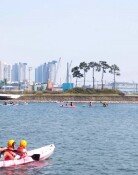Election of New Opposition Leader
Sohn Hak-kyu was elected Sunday chairman of the main opposition Democratic Party at the partys national convention. He earned the most votes from party representatives and the most support in a survey of party members. Chung Dong-young and Chung Sye-kyun joined the partys supreme council by finishing second and third in the race, respectively. The remaining three council seats went to Lee In-young, Chun Jeong-bee, and Park Ju-seon. As a result, the party`s new leadership has ended an emergency countermeasure committee system that lasted for two months after Chung Sye-kyun resigned as chairman.
The party chose change by electing Sohn. For Sohn, his former affiliation with the ruling Grand National Party has been a weakness but he effectively overcame this by being elected Democratic Party leader a second time after first being elected in 2008. As the new leader of the main opposition party despite not being from the Jeolla provinces, Sohn has gained a big edge in the 2012 presidential election. He could clash with other senior party leaders over the party line and policies, so the biggest challenge for the partys new leadership is to make the most of Sohns advantages.
Generally, the national convention of an opposition party serves as a good opportunity for drastic reform with the emergence of new figures, presentation of a new vision, and reminder to the people of its existence. The latest convention of the Democratic Party, however, presented neither new figures nor a groundbreaking vision that can draw public attention. Candidates for the party leadership engaged in factional disputes and exchanged accusations against each other. Naturally, the peoples interest waned. So how the new leadership will overcome such problems as well as the aftereffects of the convention is drawing attention.
At a meeting of its emergency countermeasure committee Sept. 17, the Democratic Party revised its centralist reform-oriented platform to a progressive one and confirmed this at the convention. It enhanced its progressive stance by scrapping the term centralist reform after 15 years. But only after the party presents policies that serve the national interest and help the working and middle classes can it promote progressive values and survive.
The primary duty of the main opposition party is to show the capability of becoming a ruling and alternative party. To do this, it should compete with the ruling party in policies and visions as well as rationally criticize and check the latter through cooperation if necessary. More than anything, the Democratic Party should inspire confidence and a sense of stability in the people on national security and North Korea policy. It should break from the reckless practice of taking sides with North Korea and using outdated politics focused on ideology. It is no exaggeration to say how the party acts will decide whether the people will choose the party overall and in the 2012 presidential election.







